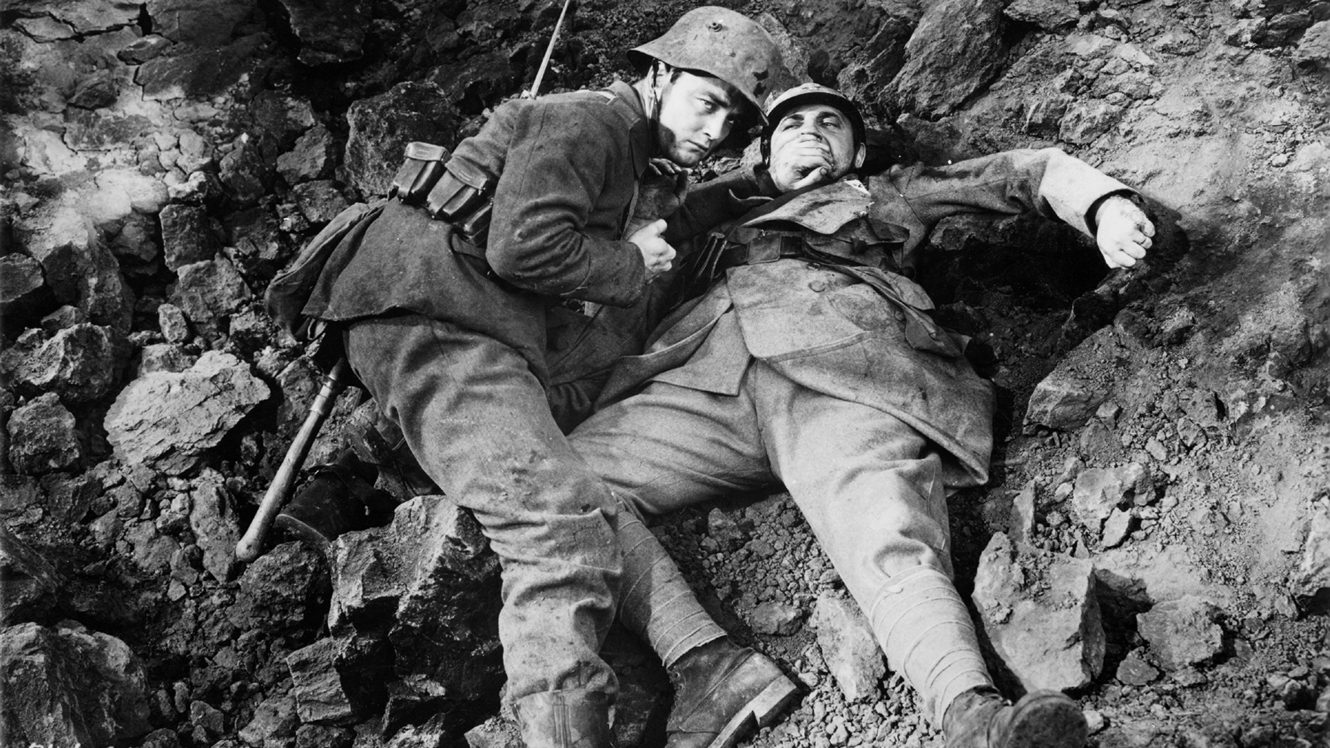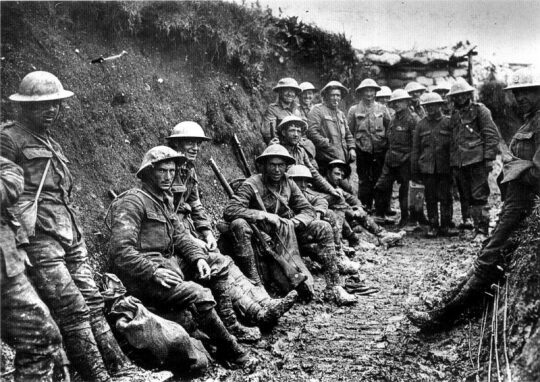Best Picture: All Quiet on the Western Front
The Other Nominees: The Big House; Disraeli; The Divorce; The Love Parade
The Academy of Motion Picture Arts and Sciences has always loved war films. When All Quiet on the Western Front took home the Best Picture trophy, fully two-thirds of that award’s winners were war films (the other being Wings). It’s not hard too understand why. The best war films are stirring epics of the loss of not only life but humanity as well; they can inspire and devastate in equal measure. At its best, All Quiet reaches that level of emotionality, and although the film is uneven at times, it reaches genuinely moving heights.
The first thing you notice while watching this film (or reading its source material, Erich Maria Remarque’s magnificent novel) is that it’s not about Americans – it’s about Germans. Granted, they’re all played by American actors, speaking with American accents (people had the same gripe about Valkyrie, which isn’t an unfair criticism, but to me is moot because I quite like that film), which at times can be jarring and remind you that the film, for all its qualities, is a product of its time, when you would never see German actors with German accents playing heroic Germans.
But sometimes, almost in spite of the points made above, the American accents can actually help the film’s message. All Quiet on the Western Front is about humanizing all the combatants of World War I, and if American viewers saw German characters sounding familiar, it could conceivably help them identify with the film’s protagonists. Make no mistake, though, it is a hurdle you’ll have to overcome, especially when lead actor Lew Ayres tries to pronounce German words (“Klosterberg” becomes “Close-terberg”).
Paul Baumer (Ayres), along with classmates including Behn (Walter Rogers), Albert (William Bakewell), Mueller (Russell Gleason), and others, is spurred to enlist in the war at the urgings of his nationalistic teacher Kantorek (Arnold Lucy). They’re wooed with rhetoric about the honor of serving the Fatherland and the glory of death on the battlefield.
At training, they’re subjected to the whims of an abusive sergeant named Himmelstoss (John Wray), also the town’s mailman. Through Himmelstoss, the film makes a point about the petty tyrants who are put in charge of the men who will actually risk and lose their lives. When they get to the front, instead of righteous battle, they find themselves trying to find food anywhere they can, and most of the time they don’t even know what town they’re in (“The sign at the railroad depot was shot off”). All Quiet isn’t a war film in the traditional sense; at times it’s philosophical, meandering, almost plotless in a way that recalls movies like The Thin Red Line or Apocalypse Now. Men will stop to ruminate on the nature and purpose of war, and death is seldom glorious; more often it’s random, senseless, and pointless.
The film makes this clear early on. 2nd Company’s first mission is to go re-string razor wire in the dead of night, hardly a job for heroes. It’s here that Behn is first blinded by a mortar barrage; stumbling around, unable to see, he’s cut down by machine-gun fire. It’s almost nihilistic in its presentation, underscored by the silence of the film, robbing Behn’s death of any sense of cinematic nobility. Director Lewis Milestone (who directed The Racket, which was up for Best Picture against our last entry, The Broadway Melody) fought tooth and nail to eschew an orchestral score, and it works to marvelous effect.
In the battle sequences, Milestone really shines as a director. The first one, a skirmish between German and French forces in No Man’s Land, is particularly thrilling. Milestone has an excellent eye for the geography of combat, and the sequence never becomes confusing. In black and white, the opposing sides’ uniforms look almost identical, speaking to All Quiet‘s running message that all soldiers are just humans at heart. It’s also surprisingly gruesome; at one point a French solider gets blown up by a grenade, leaving only his hands clutching to the razor wire (All Quiet on the Western Front luckily snuck in under the wire, as it were; censorship in Hollywood wouldn’t begin in earnest for a few more years). All Quiet only looks like a “traditional” war film through modern eyes that have seen movies like Saving Private Ryan or Hacksaw Ridge, but when this came out almost a century ago, these scenes were daringly ambitious, and they hold up remarkably well today.
But it’s the quietest moments of the film that allow it to flirt with classic status. During a raid on a town, Paul hides from the French in a ditch; when one jumps in to attack, Paul stabs the man, and then is forced to spend the night with him while he dies, hiding from mortar fire. Ayres is a fairly wooden actor, but this is his finest moment in the film. First he scolds the man for not dying quickly enough; later he consoles him, assuring him he’ll make it out. When the French solider dies, Paul begs the man to wake up and grant him forgiveness. It verges on melodrama, sure, but never quite takes the plunge.
What All Quiet on the Western Front does so well is show the futility of human sacrifice without ever becoming nihilistic. When Albert is wounded and his leg amputated, Mueller (which Ayres pronounces “Muller”) is just excited to get his hands on the man’s boots. Later, on furlough, Paul returns home (there’s a pretty serious third-act lull here, but the film course-corrects in due time), only to find Kantorek giving the same recruitment speech to his new class. Paul tells them: “It’s dirty and painful to die for your country.” After baring his soul, the boys jeer him as a coward.
In the end, Paul goes back to the front. There almost the entire company is new faces, save for Katczinsky (Louis Wolheim), whose leg is wounded by a bomb. While Paul carries him back to a field hospital, another bomb drops, killing him. The film ends with an iconic, beautiful shot, of Paul on the front lines, trying to cup a butterfly in his hands. We hear a shot ring out and Paul’s hand goes limp. It all means nothing.
All Quiet on the Western Front is damn good but it isn’t perfect. I mentioned some drag, and the strangeness of the accents, and a few of the performances are subpar. But the source material is so damn good that the entire film is able to rise above. Lewis Milestone set out to make a film about the ragged pointlessness of war, and about how the men who pay the ultimate price are never the ones who start the war to begin with. It’s well-shown in the last shot, of a cemetery with 2nd Company, overlaid on top of it, marching to the front. And it’s shown in the opening text, which reads, in part: “This story is neither an accusation nor a confession, and least of all an adventure, for death is not an adventure to those who stand face to face with it.”
Previously: The Broadway Melody
Next Up: Cimarron



